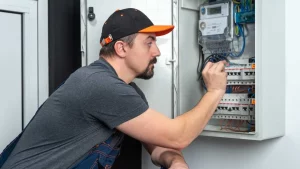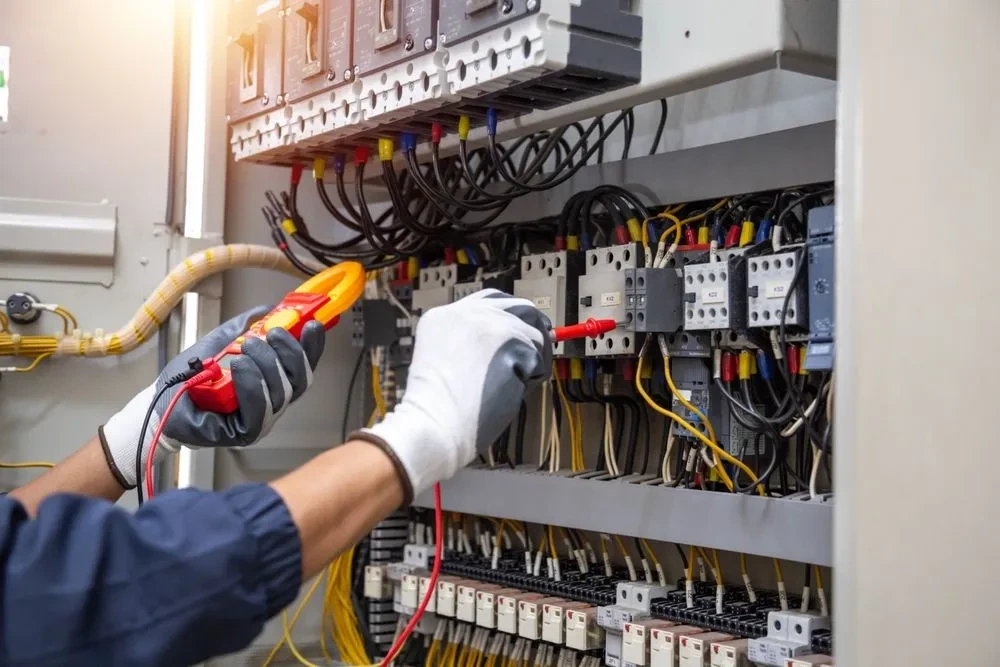In the competitive real estate market, understanding electrical safety is paramount. Many homeowners overlook the signs that their property may require rewiring. Flickering lights, tripped breakers, and charred outlets can indicate deeper issues. Recognizing these indicators can not only enhance safety but also influence a home’s value. As potential buyers become more discerning, the importance of a thorough electrical assessment becomes evident. What steps should homeowners take if these warning signs emerge?
Key Takeaways
- Look for flickering lights, which indicate outdated or overloaded wiring needing attention before selling your home.
- Frequent circuit breaker trips suggest insufficient electrical capacity, which can deter potential buyers.
- Inspect outlets for discoloration or warmth, as these signs may indicate overheating and require immediate rewiring.
- Be aware of unusual burning smells around electrical components; this indicates serious wiring issues that must be addressed.
- Consider the age of your wiring; if it’s over 30 years old, an upgrade may be crucial for attracting buyers.
Understanding the Importance of Electrical Safety in Real Estate
Although many homeowners prioritize aesthetic upgrades before selling, understanding the importance of electrical safety in real estate is essential for ensuring a property’s marketability and value. Electrical systems are often overlooked, yet they considerably impact a buyer’s perception of safety and functionality. Recognizing the signs your home needs rewiring, such as flickering lights, frequent circuit breaker trips, or discolored outlets, can prevent potential hazards and costly repairs down the line. Buyers increasingly prioritize homes that meet modern electrical standards, making it vital for sellers to address any deficiencies. By emphasizing electrical safety, homeowners not only enhance their property’s appeal but also foster a sense of security for prospective buyers, ultimately leading to a smoother transaction and higher sale price.
Common Indicators That Your Home Needs Rewiring
Numerous indicators can signal that a home requires rewiring, and recognizing these signs is essential for homeowners preparing to sell. Flickering lights often indicate underlying electrical issues, suggesting outdated or overloaded wiring. Additionally, frequent circuit breaker trips can point to insufficient electrical capacity or safety hazards. Homeowners should also be alert to the presence of charred outlets, which signify overheating or electrical arcing. Unusual odors, particularly a burning smell, may indicate damaged wiring and should never be ignored. Moreover, if the property has aluminum wiring, it may be time for an upgrade, as this material is known to pose safety risks. Identifying these signs your home needs rewiring can guarantee a safer, more attractive offering for potential buyers.

The Impact of Old Wiring on Property Value
Outdated wiring can greatly affect a property’s market value, presenting challenges for sellers. Prospective buyers often view older electrical systems as a potential liability, raising concerns about safety, efficiency, and compliance with current codes. This skepticism can lead to lower offers or prolonged market time, ultimately diminishing the perceived value of the home. Additionally, homes with outdated wiring may require costly updates, further deterring interested buyers. In a competitive real estate landscape, where buyers seek modern conveniences and safety, the presence of old wiring can be a significant disadvantage. To attract serious offers and maximize sale potential, sellers should recognize the signs their home needs rewiring, ensuring that the property meets contemporary electrical standards and buyer expectations.
How to Assess Your Home’s Electrical System
How can homeowners effectively evaluate the condition of their electrical system? A thorough assessment begins with identifying potential warning signs. Homeowners should examine outlets for discoloration or warmth, which may indicate overheating. Flickering lights often suggest wiring issues or overloaded circuits. In addition, the presence of a burning smell around electrical components can be a serious concern. Homeowners should check the age of the wiring; systems older than 30 years may require updates. Moreover, a circuit breaker frequently tripping points to underlying electrical problems. By systematically inspecting these elements, homeowners can better understand the state of their electrical system and recognize the signs their home needs rewiring, ensuring a safer environment and enhancing marketability before selling.
Steps to Take if You Recognize Signs Your Home Needs Rewiring
Recognizing signs that a home needs rewiring is only the first step; homeowners must then take decisive action to address these issues effectively. The initial action involves consulting a licensed electrician who can conduct a thorough inspection of the electrical system. This professional assessment will pinpoint specific problems and recommend necessary upgrades. Following this, homeowners should obtain multiple quotes to guarantee competitive pricing for the rewiring project. Once a contractor is selected, it is essential to secure all necessary permits to comply with local regulations. Finally, homeowners should document all work completed to enhance future resale value, as well as to provide transparency to potential buyers regarding the safety and integrity of the home’s electrical system.
Frequently Asked Questions
How Much Does Rewiring a Home Typically Cost?
Rewiring a home typically costs between $1,500 and $10,000, influenced by factors such as the home’s size, complexity of the electrical system, and local labor rates, making it a significant consideration for homeowners.
Can I Sell My Home With Outdated Wiring?
Selling a home with outdated wiring is possible, but it may deter potential buyers or lower the sale price. Buyers often prefer updated electrical systems, seeing them as essential for safety and modern living standards.
What Are the Legal Requirements for Home Wiring?
Legal requirements for home wiring vary by location but generally include compliance with local building codes, obtaining necessary permits, and ensuring work is performed by licensed professionals to guarantee safety and adherence to regulations.
How Long Does Rewiring a Home Usually Take?
Rewiring a home typically takes one to two weeks, depending on the size and complexity of the electrical system. Factors such as accessibility, local regulations, and contractor availability can also influence the timeline considerably.
Will Homeowners Insurance Cover Rewiring Costs?
Homeowners insurance typically does not cover rewiring costs unless the damage is caused by a covered peril. Homeowners should review their policy specifics, as coverage can vary considerably between different insurance providers and plans.
Conclusion
To sum up, recognizing the signs that a home may require rewiring is essential for both safety and marketability. Homeowners should remain vigilant for indicators such as flickering lights and charred outlets, as these can greatly affect property value. By proactively evaluating and addressing electrical issues, sellers not only enhance the appeal of their homes but also foster buyer confidence. Ultimately, investing in electrical safety can lead to a more successful and lucrative real estate transaction.
You May Also Like To Read:
